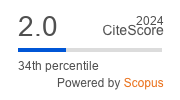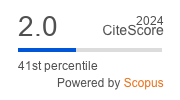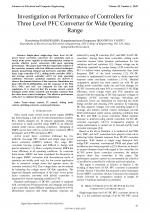| 1/2020 - 12 |
Investigation on Performance of Controllers for Three Level PFC Converter for Wide Operating RangeRAMAPRABHA, R. |
| Extra paper information in |
| Click to see author's profile in |
| Download PDF |
Author keywords
fuzzy control, PI control, sliding mode control, switching converter, system performance
References keywords
power(24), electronics(15), converter(12), control(12), current(8), controller(8), single(7), converters(7), phase(6), mode(6)
Blue keywords are present in both the references section and the paper title.
About this article
Date of Publication: 2020-02-28
Volume 20, Issue 1, Year 2020, On page(s): 91 - 98
ISSN: 1582-7445, e-ISSN: 1844-7600
Digital Object Identifier: 10.4316/AECE.2020.01012
Web of Science Accession Number: 000518392600012
SCOPUS ID: 85083744471
Abstract
Single-phase single-stage three level AC-DC power factor correction converters are commonly used as switch mode power supplies in telecommunication systems to provide effective power conversion with good operating performance. This paper deals with the comparative analysis of the converter response with four different control techniques, namely proportional integral and derivative controller (PID), fuzzy Logic controller (FLC), sliding mode controller (SMC), and average current controller (ACC) for wide operating conditions. Necessary analytical equations are derived to observe the dynamic behavior of the converter. Simulations are done with MATLAB/Simulink, and the responses of the PID, FLC, SMC, and ACC are compared for line and load regulations. It is observed that the average current control technique yields better transient and dynamic response than the other three control techniques. The effective performance of the ACC is validated through experimentation. |
| References | | | Cited By |
Web of Science® Times Cited: 4 [View]
View record in Web of Science® [View]
View Related Records® [View]
Updated 3 weeks, 6 days ago
SCOPUS® Times Cited: 4
View record in SCOPUS® [Free preview]
View citations in SCOPUS® [Free preview]
[1] Performance analysis of boost converter with cascaded inner loop fuzzy SMC, Yoganathan, Rekha, Venkatesan, Jamuna, I., William Christopher, Circuit World, ISSN 0305-6120, Issue 1, Volume 48, 2022.
Digital Object Identifier: 10.1108/CW-04-2020-0052 [CrossRef]
[2] A Fuzzy Neural Network Controller Using Compromise Features for Timeliness Problem, Wang, Lei, Dong, Liangxin, Huangfu, Ziwei, Chen, Yiyang, IEEE Access, ISSN 2169-3536, Issue , 2023.
Digital Object Identifier: 10.1109/ACCESS.2023.3246265 [CrossRef]
[3] Evaluation and Improvement of a Transformerless High-Efficiency DC–DC Converter for Renewable Energy Applications Employing a Fuzzy Logic Controller, Saravanan, S., Usha Rani, P., Thakre, Mohan P., MAPAN, ISSN 0970-3950, Issue 2, Volume 37, 2022.
Digital Object Identifier: 10.1007/s12647-021-00530-5 [CrossRef]
[4] Performance Comparison of a DC–DC Boost Converter With Conventional and Non-linear SMC Controller in Dual Loop Structure, Yoganathan, Rekha, Venkatesan, Jamuna, Narmadha, T.V., William Christopher, I., Electric Power Components and Systems, ISSN 1532-5008, 2024.
Digital Object Identifier: 10.1080/15325008.2024.2340744 [CrossRef]
Disclaimer: All information displayed above was retrieved by using remote connections to respective databases. For the best user experience, we update all data by using background processes, and use caches in order to reduce the load on the servers we retrieve the information from. As we have no control on the availability of the database servers and sometimes the Internet connectivity may be affected, we do not guarantee the information is correct or complete. For the most accurate data, please always consult the database sites directly. Some external links require authentication or an institutional subscription.
Web of Science® is a registered trademark of Clarivate Analytics, Scopus® is a registered trademark of Elsevier B.V., other product names, company names, brand names, trademarks and logos are the property of their respective owners.
Faculty of Electrical Engineering and Computer Science
Stefan cel Mare University of Suceava, Romania
All rights reserved: Advances in Electrical and Computer Engineering is a registered trademark of the Stefan cel Mare University of Suceava. No part of this publication may be reproduced, stored in a retrieval system, photocopied, recorded or archived, without the written permission from the Editor. When authors submit their papers for publication, they agree that the copyright for their article be transferred to the Faculty of Electrical Engineering and Computer Science, Stefan cel Mare University of Suceava, Romania, if and only if the articles are accepted for publication. The copyright covers the exclusive rights to reproduce and distribute the article, including reprints and translations.
Permission for other use: The copyright owner's consent does not extend to copying for general distribution, for promotion, for creating new works, or for resale. Specific written permission must be obtained from the Editor for such copying. Direct linking to files hosted on this website is strictly prohibited.
Disclaimer: Whilst every effort is made by the publishers and editorial board to see that no inaccurate or misleading data, opinions or statements appear in this journal, they wish to make it clear that all information and opinions formulated in the articles, as well as linguistic accuracy, are the sole responsibility of the author.



